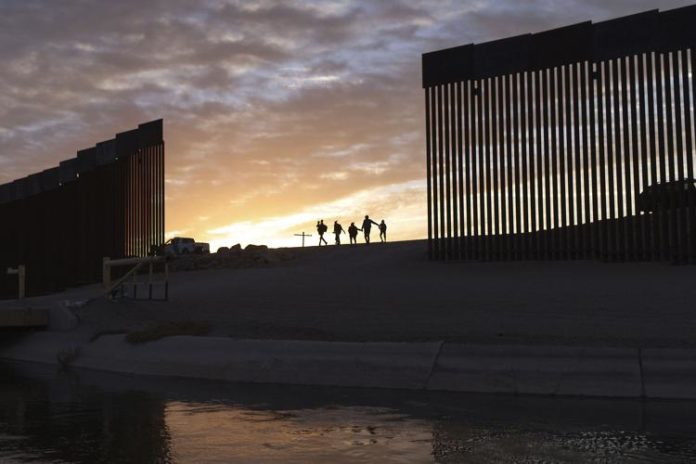
A group of Republican state lawmakers and two former Trump administration officials called Wednesday on Arizona Gov. Doug Ducey to use war powers to repel what they call an “invasion” of migrants at the southern border.
The officials say Ducey can use a novel interpretation of the U.S. Constitution to have the National Guard or state police forcibly send migrants to Mexico without regard to immigration laws and law enforcement procedures. They would operate instead as a sort of military force repelling a foreign army.
Ducey, a Republican, has aggressively challenged President Joe Biden’s border policies, most recently in his state of the state address on Monday, when he said “the White House and Congress have decided to turn a blind eye” to what he called “a national crisis.” He has sent National Guard members and Department of Public Safety officers to assist local law enforcement and the Border Patrol.
But the lawmakers said extraordinary steps are required because of the number of people and drugs crossing the border illegally.
“An invasion would normally be referenced in terms of a nation-state invasion, but when you look at these numbers, I think it’s safe to say that this is an invasion,” Rep. Jake Hoffman, a Queen Creek Republican, said at a news conference with about 20 other GOP lawmakers.
Republican governors have deployed thousands of National Guard members to patrol the border, including around 150 from Arizona who work in support roles but don’t apprehend immigrants. The lawmakers and former Trump officials want them empowered to do much more.
The U.S. Border Patrol reported more than 1.6 million encounters with migrants along the U.S.-Mexico border from September 2020 to September 2021, more than quadruple the number in the prior fiscal year and the highest annual total on record.
Their demand relies on a novel interpretation of the U.S. Constitution, which says states cannot “engage in War unless actually invaded.” There’s no limits on the governor’s power to determine what constitutes an invasion and respond accordingly, Ken Cuccinelli, the former deputy secretary of Homeland Security and head of the legal immigration agency during Donald Trump’s presidency, said at the news conference in Phoenix.
He envisions a border force unburdened by the need to comply with U.S. immigration laws, which allow migrants to claim asylum and potentially make a case to a judge before being deported.
“The way I would do it is I would thumbprint them, give them food and water, and put them back across the border,” said Cuccinelli, who is now a senior fellow at the Center for Renewing America. “You’re not building facilities. You’re not holding for long periods of time.”
Paul Bender, a constitutional law professor at Arizona State University, said the constitutional provision Cuccinelli cites is meant to restrain the states, not empower them.
“I think the invasions the Framers had in mind were organized invasions by the governments of other countries, not by disorganized undocumented aliens,” Bender wrote in an email. “The plain plan of the Constitution was to have immigration matters handled by the federal government, not by the states.”
Federal law gives the president the power to get help from local authorities when facing a “mass influx” of migrants, said Ahilan Arulanantham, co-director of the Center of Immigration Law and Policy at the University of California, Los Angeles Law School. Declaring an invasion to suspend civil liberties would be both legally and politically dubious, he said.
“The purpose of statements like this is obviously to whip up anti-immigrant sentiment and to play into fears which are encoded with racism,” Arulanantham said.
Hoffman in October asked Republican Attorney General Mark Brnovich for a legal opinion on another constitutional provision guaranteeing that the federal government will protect states from invasion. Brnovich has not responded, Hoffman said.
Hoffman said the lawmakers support using the state’s sizeable budget surplus to pay for the action but declined to say how much.
Republished with the permission of the Associated Press.













